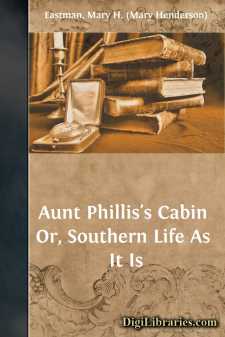Categories
- Antiques & Collectibles 13
- Architecture 36
- Art 48
- Bibles 22
- Biography & Autobiography 813
- Body, Mind & Spirit 142
- Business & Economics 28
- Children's Books 15
- Children's Fiction 12
- Computers 4
- Cooking 94
- Crafts & Hobbies 4
- Drama 346
- Education 46
- Family & Relationships 57
- Fiction 11828
- Games 19
- Gardening 17
- Health & Fitness 34
- History 1377
- House & Home 1
- Humor 147
- Juvenile Fiction 1873
- Juvenile Nonfiction 202
- Language Arts & Disciplines 88
- Law 16
- Literary Collections 686
- Literary Criticism 179
- Mathematics 13
- Medical 41
- Music 40
- Nature 179
- Non-Classifiable 1768
- Performing Arts 7
- Periodicals 1453
- Philosophy 64
- Photography 2
- Poetry 896
- Political Science 203
- Psychology 42
- Reference 154
- Religion 513
- Science 126
- Self-Help 84
- Social Science 81
- Sports & Recreation 34
- Study Aids 3
- Technology & Engineering 59
- Transportation 23
- Travel 463
- True Crime 29
Aunt Phillis's Cabin Or, Southern Life As It Is
Description:
Excerpt
CHAPTER I.
There would be little to strike the eye of a traveler accustomed to picturesque scenes, on approaching the small town of L——. Like most of the settlements in Virginia, the irregularity of the streets and the want of similarity in the houses would give an unfavorable first impression. The old Episcopal church, standing at the entrance of the town, could not fail to be attractive from its appearance of age; but from this alone. No monuments adorn the churchyard; head-stones of all sizes meet the eye, some worn and leaning against a shrub or tree for support, others new and white, and glistening in the sunset. Several family vaults, unpretending in their appearance, are perceived on a closer scrutiny, to which the plants usually found in burial-grounds are clinging, shadowed too by large trees. The walls where they are visible are worn and discolored, but they are almost covered with ivy, clad in summer's deepest green. Many a stranger stopped his horse in passing by to wonder at its look of other days; and some, it may be, to wish they were sleeping in the shades of its mouldering walls.
The slight eminence on which the church was built, commanded a view of the residences of several gentlemen of fortune who lived in the neighborhood. To the nearest one, a gentleman on horseback was directing his way. The horse required no direction, in truth, for so accustomed was he to the ride to Exeter, and to the good fare he enjoyed on arriving there, that neither whip nor spur was necessary; he traced the familiar road with evident pleasure.
The house at Exeter was irregularly built; but the white stone wings and the look-out over the main building gave an appearance of taste to the mansion. The fine old trees intercepted the view, though adding greatly to its beauty. The porter's lodge, and the wide lawn entered by its open gates, the gardens at either side of the building, and the neatness and good condition of the out-houses, all showed a prosperous state of affairs with the owner. Soon the large porch with its green blinds, and the sweetbrier entwining them, came in view, and the family party that occupied it were discernible. Before Mr. Barbour had reached the point for alighting from his horse, a servant stood in readiness to take charge of him, and Alice Weston emerged from her hiding-place among the roses, with her usual sweet words of welcome. Mr. Weston, the owner of the mansion and its adjoining plantation, arose with a dignified but cordial greeting; and Mrs. Weston, his sister-in-law, and Miss Janet, united with him in his kind reception of a valued guest and friend.
Mr. Weston was a widower, with an only son; the young gentleman was at this time at Yale College. He had been absent for three years; and so anxious was he to graduate with honor, that he had chosen not to return to Virginia until his course of study should be completed. The family had visited him during the first year of his exile, as he called it, but it had now been two years since he had seen any member of it. There was an engagement between him and his cousin, though Alice was but fifteen when it was formed. They had been associated from the earliest period of their lives, and Arthur declared that should he return home on a visit, he would not be able to break away from its happiness to the routine of a college life: he yielded therefore to the earnest entreaties of his father, to remain at New Haven until he graduated.
Mr. Weston will stand for a specimen of the southern gentleman of the old school. The bland and cheerful expression of his countenance, the arrangement of his soft fine hair, the fineness of the texture and the perfect cleanliness of every part of his dress, the plaiting of his old-fashioned shirt ruffles, the whiteness of his hand, and the sound of his clear, well-modulated voice—in fact, every item of his appearance—won the good opinion of a stranger; while the feelings of his heart and his steady course of Christian life, made him honored and reverenced as he deserved. He possessed that requisite to the character of a true gentleman, a kind and charitable heart.
None of the present members of his family had any lawful claim upon him, yet he cherished them with the utmost affection....



